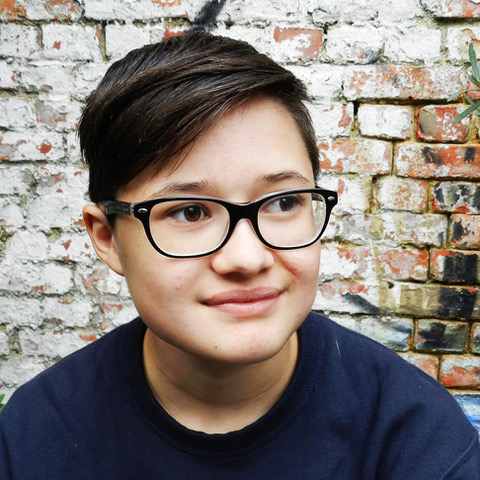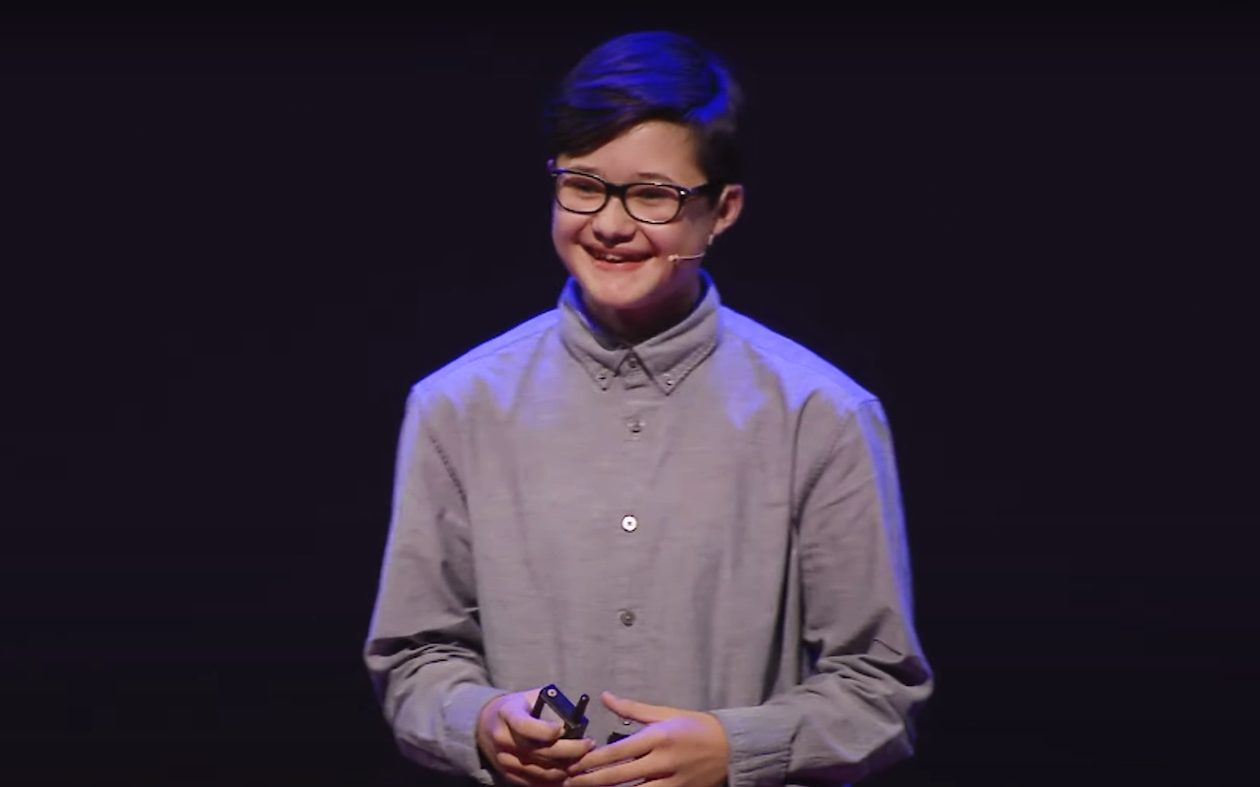When you first start watching the TED talk by teenager Bo Grove, you might think, “Cool, a smart coder kid, interesting story.” But pretty quickly you learn he’s not just a coder. He’s a multipotentialite—and he talks in a really unique way about how he learns and why.
Emilie and I knew right away we wanted to talk to Bo and feature him on Puttylike. He has the kind of enthusiasm that gets you excited about learning, trying new things, and being a multipod. So I sat down with him (and his awesome mom Saskia) for a video interview a few weeks ago. I asked him all about what it’s like being a teen multipotentialite, what’s going on in his fascinating brain, and his advice for other teens and adults.
Always skimming
“What I call ‘skimming’ is jumping from one subject to another, so you never run out of new information.”
That’s Bo, during his TED talk, describing how he gets bored if he spends too long on one thing—he’s endlessly curious for new subjects and how they all connect. He tells the audience about an all-too-familiar chorus to many of us multipotentialites: facing disapproval from folks who think you need to focus on just one passion in order to succeed.
But I wanted to know more about skimming itself—whether it’s a continuous process of evaluating each subject, or whether it’s just the act of jumping itself, after boredom happens.
When I spoke to Bo, he told me one of his current interests is biology; he’s taking extra classes outside of school. Genetics, DNA, RNA, stuff like that.
“Do you think it’s something you’ll want to explore for a while?” I asked. “Or is it just kind of like, ‘I’m doing the skimming thing’ to see?”
He and his mom laugh. “Always—” she starts.
“I’m actually always skimming,” he says. And he usually doesn’t go too deep.
But, he says, biology is a very basic, underlying thing—nearly every subject connects to it. So that holds an appeal. He could be into it for a while.
He also told me about a creative writing project he just completed. He and a hundred other kids learned about how to write stories, and then each wrote a story about how they would have created the earth (an amazing prompt, for those of you reading who are writers!). The project will become a published book soon. Bo seems as delighted by constructing a story as he is by understanding genetics.
I ask him if he knows what’s next—does he keep a subject or interest waiting on the horizon? Not really, he says. “I do things, and then I come across something and I go ‘Oh, I want to try that.’ And then I try it.”

On Bo’s team
Even from the TED talk, I could see that Bo is thriving. It made me imagine an incredible future, where all the multipotentialite teenagers out there might thrive, too. I wondered how Bo got so assertive and articulate about his own thinking. What kind of opposition had he faced? And what kind of team was backing him up?
He told me the toughest opposition to his multipotentiality is the school system: “In Belgium the schools are quite specific. There are art schools and tech schools and science schools. They make you make the first decision at twelve years old, which is quite early. And your university depends on it. So that was quite hard… that they force you into a box at such an early age, and the rest of your studies depend on that choice.”
Bo started at an art school, where he spent two years specializing in traditional art (painting, drawing, etc.). It was fun, he says. “But I realized—I’m not going to spend my whole life doing that.” And it’s not just a matter of changing a few classes: “The schools are like, physically different school buildings of specialization.”
Luckily, he was able to switch to a science school, which he chose “because the options there were the most open… we get science, math, and three languages.” And the science school is also the least restrictive choice for his options at university, later.
I ask Bo if people at his new school have been supportive of his wide interests. He says yes—he feels good about it. “Our school is very open, and modern, and they really focus on keeping all your options open, and letting the students explore.”
One of his friends is a “skimmer” like him, too. “He is really into art, and also music, and all this other stuff… he actually wants to be an architect right now, but that sentence has changed like five times this year—”
“Just like yours.” Bo’s mom teases. “Every week!”
We laugh. I ask Saskia what that’s like, as Bo’s mom.
“Um…”
Bo says, “Annoying.” He’s laughing.
Saskia laughs, too. “Annoying.”
She makes us laugh even more with her impression of Bo. “Well, we try to be as flexible and supportive as possible, but it goes from like… ‘I’m bored in English class because I have an English dad, so I wanna learn Japanese.’ And then after two years of Japanese we get ‘I wanna go play baseball,’ and then after two months of baseball you get, ‘I’m gonna play badminton.’ You know?”
She may find it annoying to constantly be getting into new routines. And yes, each new interest requires books or outfits, and all kinds of logistics. But I can tell I’ve found one of Bo’s biggest supporters right next to him, incredibly proud. I wish every mulitpod teen had a winning team like his.
Navigating with a mind map
In Bo’s TED talk, he describes something remarkable. He says “I’ve created an overview in my head of all the different subjects that I’ve seen and explored, up to now.” In the overview, some subjects are bigger: the ones he’s spent more time on, or understands more, or feels a connection to. These are the subjects that he might want to dive deeper into, stick with for a longer period of time. “And I’ve only found these subjects because I’ve skimmed.”
I wanted to know all about this overview. Is it a visual? Or a physical representation in his mind?
“Yeah. It’s basically like a mind map, in categories. And they’re somehow—all linked together. So the sports will be together. But then that would link to biology, for like, muscles and heart rate and stuff like that.”
I am totally fascinated by this. I love knowing a lot of random things, and finding connections between different subjects. But being able to visualize a map of all of my current knowledge? I am in love with the idea of doing this, even as I’m baffled by the challenge.
I ask Bo if he ever makes unexpected connections based on where subjects overlap on his map.
He says yes. I put him on the spot by asking for an example, but he comes up with a really great one: “I was recently playing the piano… [not just playing around but] actually, actively playing the piano. And I was surprised of how much mathematics goes into music.”
Bo’s mom asks him if he could draw a picture of his mind map, and he says that would be quite hard. Different subjects on the map form “on the spot” as he reflects, and he’s always making new connections and changing it all. So it would be difficult.
I tell him that when his interests cycle back to art, drawing his map is his next challenge. He just laughs.

Don’t be afraid of choices
I asked Bo if he has any advice for other teens who are skimmers or multipotentialites. And he didn’t disappoint:
“I would say don’t be afraid of the choices, because you don’t need them yet. I know there’s like… the thing with the Belgian school system, right. Where you have to make choices. But they still didn’t stop me from doing things. You’re at an age where you can just— you’re allowed to just experiment and just try things out, you know.”
For those of us with teen multipotentialites in our lives, I think this is great advice to build upon. We need to support our teens exploring their many interests and trying stuff out—no matter how weird or unconnected they may seem to be, or how much our specialist culture might be pressuring them to narrow it down. The choices they make now don’t have to define their identity or future.
What about adults, the older multipods? Bo says, “If I were an adult, I don’t think I would stop skimming. Like even if I had the most boring job. You can still like—do things, you know. I don’t think that anything you chose to do, should be the end.”
It makes me think of his ever-evolving mind map again. Again, I wonder what the world would be like if we all thought a little more like Bo: less invested in being experts, and more invested in being curious, and always learning something new. I think that would be pretty neat.
**
Don’t forget to watch Bo’s TED talk for a bit of inspiration! (Or maybe you just need some more #BrightThings in your day!)
Your Turn
Do you skim like Bo, or do you dive deep and then resurface for another dive? What about that mind map– do you have a visual in your head of everything you know?

That mind map sounds amazing! I’m definitely a scanner who moves whenever something sparks my interest (although has led to a few burnouts).
I loved when he talked about “biology is a a basic, underlying thing that connects to everything”. It’s the exact reason I studied business at college!
From that, I’m starting to get a clearer picture as to why I now study digital marketing at uni: it’s a mix of all most of my interests (studying humanity and creative arts).
Sound article; top bloke!
I love that concept too — of finding subjects that overlap many things! Business is a great example. Or like our profile of Theo Morrow a few weeks back– he studied architecture, which is at the intersection of a ton of stuff (art, engineering, math). Thanks Joshua!!
It’s interesting to me too that he says biology is a broad topic. I think a lot of topics can be very broad – I studied Library and Information Science, which is very broad because it’s the cataloguing of all topics, and now I work at editing and translating, which is broad because the paper I edit or translate can be on any topic. And Joshua says in his comment that he studied business because it’s a broad topic. There are probably many topics that are broad or that can be made broad or that can be connected to other topics. Even mathematics can be connected to physics and music and art and architecture and child development and probably other areas too. There’s so much to explore!
Exactly!! I work in a library right now and I love it for just that reason!! 🙂 (Did you see my article about libraries? https://puttylike.com/multipotentialite-magic-happens-here-why-you-should-head-to-the-library-right-now/ )
As this multipod’s mom, I’d like to thank you all for welcoming Bo to the Puttylike community ! After many difficult years at school, being ‘different’ and misunderstood, he now found the strength to speak up and share his thoughts with the world, no matter what someone else might think of it. As he put it himself “let us live and learn, and we will achieve great things”.
I can very much relate to the over arching connection of biology to my multipotenitalite mind and activities. I’m a mechanical engineer, musician and 7 years ago studied biomimicry. Biomimicry is the art of solving problems using wisdom out of nature. Since then I learned a lot about biology and this grounded myself very much. It helps me to see all the connections between all my diferent interests and nature is a guide for me ever since. When I need to make a decision of any kind I ask, how would nature do it? In most cases I find quick answers and assurance by asking nature. This is a strong basment for me and gives me ease.
Oh I absolutely loved this post! “I don’t think that anything you chose to do, should be the end.” YES. I wish multipotentiality had been acknowledged when I was a teen, and reading this makes me hopeful that perhaps an awareness of this can create big changes in education systems and maybe on into the adult world of careers etc. I fought for ages against people telling me I had to “pick one thing”, and even now the worry that I’ve messed stuff up by not getting specific pops up from time to time. But I’m definitely a skimmer too, and I’ve embraced curiosity as one of my core values. Now, I’m off to make my mind map…
A great profile of a unique person with a bright future. I fluctuate between Bo’s concept of skimming and deep diving. I might read 5 to 10 books on a subject and decide ‘that’s enough” just as often as I’ll read a single article and decide the same. Is there such a concept of seasonal learning?
I hope to meet Bo one day at a future Everything Conference.
This multipotentiality issue is attracting me more and more. I am calm in knowing that I am not alone in this incessant search for news. I am happy for the post mentioning the life trajectory of a teenager who is discovering life. It reminds me of my teenage years about the choices I wanted to make and I couldn’t because of the limitations imposed by society at that time. When I was a teenager I had a dreamy spirit. I thought that whatever was done should have a hint of dream in the mix to have that most romanticized inspiration of events. And because of that I suffered bullying in schools and in my own family. Today when reading the post I had the privilege of traveling to the past, back in my teens, away from limitations and obligations. I was able to relive my adolescence a little bit of fantasies and dreams. I confess it was good and I came back more rejuvenated than before. So following the advice of the youngest, sometimes, it can be very good for the inner child who is tied to the bonds to manifest itself again and to have its shine as before. Nowadays, when I have to do an exhausting task, I just add a little bit of romanticism and the burden becomes lighter. I can say with all conviction that it is worth dreaming. Thanks for posting. For more inspirational posts like the one I just read.
Personally I do use mind maps and love em. But to create a map of my own knowledge and interrests could be far too challenging. I´d rather take another skill 😀
We have the same shitty education system here too and on top of that I was forced to leave the broad one /grammar school and choose a narrower technical one – I´ve completely messed the entrance examination but they took me anyway… what a sad memories of mine…
btw. are you guys also have a few different groups of friends that don´t know about the other ones? 😀